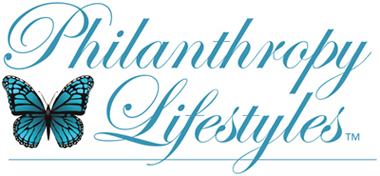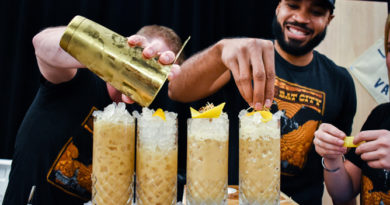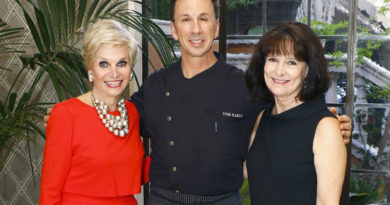The Trinity Trust Hosts an Inside Scoop Event to Discuss Concept of Newly-Unveiled Trinity River Park
DALLAS, Texas, June 8, 2016 – The Trinity Trust Foundation held an event on June 1 with 70 members of its Rat Pack and River Rats membership groups to reveal the concept of the Mayor’s newly-unveiled Trinity River Park.
(Featured photo: Gail Thomas, Brent Brown, Deedie Rose. Photo by Jerry McClure.)
Gail Thomas, president and CEO of The Trinity Trust, welcomed everyone and introduced interim Chair of the Board, Deedie Rose. “Deedie loves design and architecture, and because of her interest in design, she helped to facilitate and fund the City of Dallas’ CityDesign Studio, which is housed in Dallas City Hall. She also loves nature, so this park is something she wants to tell you about in more detail.”
Deedie Rose said, “The idea is for a beautiful, fantastic space that can bring together all socio-economic groups. We finally have a concept that will do that. I want to commend our Mayor (Mike Rawlings) for asking the question last year with all this flooding, which was, ‘Can we build a park?’ He was smart and used design going to the experts who have planned parks similar to the one we want in Dallas. Now we have a concept, and there will be public input because it’s for the public.”
She then introduced Brent Brown, AIA, who is the founding director of the Dallas CityDesign Studio, and founder of buildingcommunityWORKSHOP.
Brown talked about the proposed park concept, which spans more than 285 acres in the heart of the city, encompassing the Margaret Hunt Hill Bridge, Margaret McDermott Bridge and the Ronald Kirk Pedestrian Bridge (Continental Avenue Bridge). The area connects both sides of the Trinity River from downtown Dallas to Southern Dallas/West Dallas/Oak Cliff. This location was selected because of its close proximity to downtown.
Brown took the audience through a series of slides and propositions about the proposed Trinity River Park concepts:
- Reclaiming sinuosity. How can we reclaim this river?
- A Welcome Flood. “We saw people enjoy the river during the flood season.”
- Disrupting the Flatness. The water breaks up this land.
- Destination Nodes.
- Circulation is the engine of design. “Align the programmatic desires and the pragmatic needs of the park.”
- Build landscape connections. “Create landscape connections from the city to the park.” The ideas for these include overlooks to extend into the city from three points to the Trinity River: (1) Reunion; (2) West Commerce; (3) 505 Riverfront area.
Brown added that these photos are a representation of an urban park, which is a concept, consistent with the Balanced Vision Plan, completed in 2003 and endorsed by the Dallas City Council to transform and restore 10,000 acres of the Trinity River Corridor, one of the largest public works projects in the nation. Costs of the park will be based on the final plans and availability of funds through public and private fundraising efforts.
The conceptual plans were funded through The Trinity Trust with a gift from Deedie and the late Rusty Rose. The funds were part of a $5 million gift given in 2009 to explore possibilities for the Trinity River Corridor. Also from that gift, funds were provided to create the Dallas CityDesign Studio housed at Dallas City Hall, to support bcWORKSHOP and to fund the Connected City Design Challenge that brought the best ideas for redevelopment to the Trinity.

The model of the Trinity River Park concept is on display for public viewing in the City Hall lobby. Over the coming months, there will be various community engagement efforts. These will help to further develop a design and programming plan for the five connector parks that can feed new life into the communities they touch. The community is asked to give their input at these meetings and through a new website: http://www.newtrinityvision.com.
About The Trinity Trust Foundation:
The Trinity Trust Foundation helps the city by raising private funds for this $2.2 billion urban park project. Donations from the private sector will add amenities. The Trinity Trust also reaches out into the community to educate citizens about the project with presentations, symposia and events. More information can be found by calling 214.740.1616, by emailing info@thetrinitytrust.org, or by visiting http://thetrinitytrust.org/.
(Press release courtesy Trinity Trust Foundation. Photos by Jerry McClure.)






